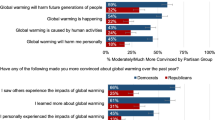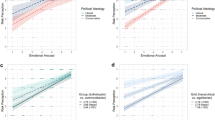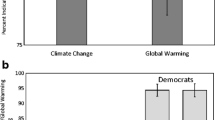Abstract
Experiments embedded in surveys of nationally representative samples of American adults assessed whether attitudes toward preparation for the possible effects of global warming varied depending on who endorsed such efforts, the stated purpose of preparation, the consequences of global warming targeted in a preparation message, and the words used to describe preparation and its alternative. Collapsing across all experiments, most (74 %) Americans preferred preparing for possible consequences of global warming. The experimental manipulations produced statistically significant variation in this percentage, but in ways inconsistent with a series of perspectives that yield predictions about this variation. Preference for preparation was not greater when it was described using more familiar or simpler terms (preference for preparation was greatest when it was described as to “increase preparedness” and least when described as “increase resilience”), when efforts were said to be focused on people’s health rather than on people and the environment generally or on coastal ecosystems in particular, or when preparation was endorsed by more generally trusted groups (preference for preparation was highest when no one explicitly endorsed it or when endorsed by government officials or university researchers and declined when religious leaders or business leaders endorsed it). Thus, these experiments illustrate the value of empirical testing to gauge the impact of variation in descriptions of policy options in this arena and illustrate how communication approaches may have influenced public opinion in the past.
Similar content being viewed by others
Explore related subjects
Discover the latest articles and news from researchers in related subjects, suggested using machine learning.Notes
The present study did not investigate the effects of other types of framing, such as gain vs. loss framing (Tversky and Kahneman 1981).
Respondents were randomly assigned to hear the question as shown here or to hear the two alternatives in the reverse order (“try to prepare for the changes before they happen…” preceded “wait for these changes to happen and then adapt to the”). This manipulation did not cause a statistically significant change in the distribution of responses in the full sample (p = .46) or among respondents who had no college education, among whom response order effects are typically strongest (p = .96).
The no endorser vs. endorser versions varied not only in terms of the mention of an endorser but in the use of the word “could” vs. “should.” This difference in language was intentional, since in the absence of an endorser, the question could not sensibly offer an admonition to take a particular action.
Different subgroups of the population may differ in how much they trust various endorsers. We explored the net impact of mentioning an endorser on the entire population, which is of interest because it is often challenging to deliver a tailored message to only a specific subgroup of the population and a different message to other subgroups.
References
Albarracin D, Johnson BT, Zanna MP (eds) (2005) The handbook of attitudes. Lawrence Erlbaum Associates Publishers, Mahwah
Berlyne DE (1970) Novelty, complexity, and hedonic value. Percept Psychophys 8(5):279–286
Boninger DS, Krosnick JA, Berent MK (1995) Origins of attitude importance: self-interest, social identification, and value relevance. J Personal Soc Psychol 68(1):61–80
Bornstein RF (1989) Exposure and affect: overview and meta-analysis of research, 1968-1987. Psychol Bull 106(2):265–289
Cacioppo JT, Petty RE, Morris KJ (1983) Effects of need for cognition on message evaluation, recall, and persuasion. J Personal Soc Psychol 45(4):805–818
Chong D, Druckman JN (2007) Framing theory. Annu Rev Politic Sci 10:103–126
Colman AM, Sluckin W, Hargreaves DJ (1981) The effect of familiarity on preferences for surnames. Br J Psychol 72(3):363–369
de Loë R, Kreutzwiser R, Moraru L (2001) Adaptation options for the near term: climate change and the Canadian water sector. Glob Environ Change 11(3):231–245
Eakin H, Luers A (2006) Assessing the vulnerability of social-environmental systems. Annu Rev Environ Res 31:365–394
Etkin D, Ho E (2007) Climate change: perceptions and discourses of risk. J Risk Res 10(5):623–641
Friedman U, Narula SK (2014) The UN’s new focus: Surviving, not stopping, climate change. The Atlantic. http://www.theatlantic.com/international/archive/2014/04/the-uns-new-focus-surviving-not-stopping-climate-change/359929/. Accessed 7 April 2014
Gawronski B, Bodenhausen GV (2006) Associative and propositional processes in evaluation: an integrative review of implicit and explicit attitude change. Psychol Bull 132(5):692–731
Gifford R, Comeau LA (2011) Message framing influences perceived climate change competence, engagement, and behavioral intentions. Glob Environ Change 21(4):1301–1307
Hetherington MJ (1999) The effect of political trust on the presidential vote, 1968–96. Am Political Sci Rev 93(2):311–326
Holdren JP (2010) Text of remarks by Obama science adviser John Holdren to the National Climate Adaptation Summit. Climate Science Watch. http://www.climatesciencewatch.org/2010/05/28/text-of-remarks-by-obama-science-adviser-john-holdren-to-the-national-climate-adaptation-summit/. Accessed 8 October 2013
Hovland CI, Janis IL, Kelley HH (1953) Communication and persuasion: psychological studies of opinion change. Yale University Press, New Haven
Intergovernmental Panel on Climate Change (IPCC) (2013) Climate change 2013: the physical science basis. In: Stocker TF, Qin D, Plattner GK, Tignor MMB, Allen SK, Boschung J, Nauels A, Xia Y, Bex V, Midgley PM (eds) Contribution of working group I to the fifth assessment report of the intergovernmental panel on climate change. Cambridge University Press, Cambridge and New York
Intergovernmental Panel on Climate Change (IPCC) (2007) Global climate projections. In: Solomon S, Qin D, Manning M, Chen Z, Marquis M, Averyt KB, Tignor M, Miller HL (eds) Climate change 2007: the physical science basis. contribution of working group I to the fourth assessment report of the intergovernmental panel on climate change. Cambridge University Press, Cambridge and New York, pp 433–497
Jackson L (2011) U.S. Environmental Protection Agency Policy Statement on Climate-Change Adaptation. http://www.epa.gov/climatechange/Downloads/impacts-adaptation/adaptation-statement.pdf. Accessed 7 April 2014
Jacoby LL, Kelley CM (1987) Unconscious influences of memory for a prior event. Personal Soc Psychol Bull 13:314–336
Kaufman L (2011) A city prepares for a warm long-term forecast. The New York Times. http://www.nytimes.com/2011/05/23/science/earth/23adaptation.html?_r = 1&. Accessed 7 April 2014
Kerry J (2014) Release of Intergovernmental Panel of Climate Change Working Group 2 Report. U.S. Department of State. http://www.state.gov/secretary/remarks/2014/03/224161.htm. Accessed 7 April 2014.
Kinder DR, Sanders LM (1990) Mimicking political debate within survey questions: the case of white opinion on affirmative action for blacks. Soc Cogn 8(1):73–103
Kucera H, Francis WN (1967) Computational analysis of present-day American English. Brown University Press, Providence
La Vorgna M, Passalacqua L (2013) Mayor bloomberg outlines ambitious proposal to protect city against the effects of climate change to build a stronger, more resilient New York. NYC: The official website of the City of New York. http://www1.nyc.gov/office-of-the-mayor/news/201-13/mayor-bloomberg-outlines-ambitious-proposal-protect-city-against-effects-climate-change. Accessed 7 April 2014
Luers AL, Moser SC (2006) Preparing for the impacts of climate change in California: Opportunities and constraints for adaptation. Report prepared for the California Energy Commission, Public Interest Energy Research Program and the California Environmental Protection Agency, Sacramento, California, CEC-500-2005-198-SF
Meinke H, Stone RC (2005) Seasonal and inter-annual climate forecasting: the new tool for increasing preparedness to climate vulnerability and change in agricultural planning and operations. Clim Change 70:221–253
Miller DT (1999) The norm of self-interest. Am Psychol 54(12):1053–1060
Miller JM, Krosnick JA (2000) News media impact on the ingredients of presidential evaluations: politically knowledgeable citizens are guided by a trusted source. Am J Political Sci 44(2):301–315
Monroe BM, Read SJ (2008) A general connectionist model of attitude structure and change: the ACS (Attitudes as Constraint Satisfaction) model. Psychol Rev 115(3):733–758
Moser SC, Dilling L (2013) Communicating climate change: opportunities and challenges for closing the science-action gap. In: Dryzek JS, Norgaard RB, Schlosberg D (eds) The Oxford handbook of climate change and society. Oxford University Press, Oxford, UK, pp 161–175
Myers TA, Nisbet MC, Maibach EW, Leiserowitz AA (2012) A public health frame arouses hopeful emotions about climate change. Clim Chang 113:1105–1112
National Research Council (NRC) (2010) Adapting to the impacts of climate change. The National Academies Press, Washington, DC
Petty RE, Cacioppo JT (1986) Communication and persuasion: central and peripheral routes to attitude change. Springer, New York
Petty RE, Wegener DT (1998) Attitude change: multiple roles for persuasion variables. In: Gilbert D, Fiske S, Linzey G (eds) The handbook of social psychology, 4th edn. McGraw-Hill, New York, pp 323–390
Petty RE, Cacioppo JT, Goldman R (1981) Personal involvement as a determinant of argument-based persuasion. J Personal Soc Psychol 41(5):847–855
Putnam RD (2000) Bowling alone: the collapse and revival of American community. Simon and Schuster, New York
Rayner K, Duffy SA (1986) Lexical complexity and fixation times in reading: effects of wordfrequency, verb complexity, and lexical ambiguity. Memory Cogn 14(3):191–201
Rodgers P (2014) Climate change: We can adapt, says IPCC. Forbes. http://www.forbes.com/sites/paulrodgers/2014/03/31/climate-change-is-real-but-its-not-the-end-of-the-world-says-ipcc/. Accessed 7 April 2014
Sears DO, Funk CL (1990) Self-interest in Americans' political opinions. In: Mansbridge JJ (ed) Beyond self-interest. University of Chicago Press, Chicago, pp 147–170
Sereno S, Rayner K (2003) Measuring word recognition in reading: eye movements and event- related potentials. Trends Cogn Sci 7(11):489–493
Sherman M (1976) Adjectival negation and the comprehension of multiple negated sentences. J Verb Learn Verb Behav 15:143–157
Sherman SJ, Cialdini RB, Schwartzman DF, Reynolds KD (1985) Imagining can heighten or lower the perceived likelihood of contracting a disease: the mediating effect of ease of imagery. Personal Soc Psychol Bull 11(1):118–127
Song H, Schwarz N (2008) If it’s hard to read, it’s hard to do: processing fluency affects effort prediction and motivation. Psychol Sci 19(10):986–988
Spence A, Pidgeon N (2010) Framing and communicating climate change: the effects of distance and outcome frame manipulations. Glob Environ Change 20(4):656–667
Sternthal B, Phillips LW, Dholakia R (1978) The persuasive effect of source credibility: a situational analysis. Public Opin Q 42(3):285–314
Thomsen DC, Smith TF, Keys N (2012) Adaptation or manipulation? unpacking climate change response strategies. Ecol Soc 17(3):20–29
Tol RSJ (2005) Emission abatement versus development as strategies to reduce vulnerability to climate change: an application of FUND. Environ. and Dev. Econom. null(5):615-629
Tversky A, Kahneman D (1981) The framing of decisions and the psychology of choice. Science 211(4481):453–458
van Aalst MK (2006) The impacts of climate change on the risk of natural disasters. Disasters 30(1):5–18
Vendley WF (2011) Forward from the Secretary General. In Action and advocacy for climate change: A resource guide for religious communities. Religions for Peace—International. New York, New York. http://religionsforpeace.org/assets/action-and-advocacy-for.pdf. Accessed 7 April 2014.
Wembridge ER, Means ER (1918) Obscurities in voting upon measures due to double-negatives. J Appl Psychol 2(2):156–163
Whittlesea BWA, Williams LD (2000) The source of feelings of familiarity: the discrepancy–attribution hypothesis. J Exp Psychol Learn Mem Cognition 26(3):547–565
Whittlesea BWA, Williams LD (2001) The discrepancy–attribution hypothesis: I. the heuristic basis of feelings and familiarity. J Exp Psychol Learn Mem Cognition 27(1):3–13
Wilbanks T, Bilello D, Schmalzer D, Scott M et al (2012) Climate change and energy supply and use: technical report to the U.S. department of energy in support of the national climate assessment. Oak Ridge National Laboratory, Oak Ridge
Zajonc RB (1968) Attitudinal effects of mere exposure. J Personal Soc Psychol 9(2):1–27
Acknowledgments
This study was sponsored by the Woods Institute for the Environment and the Center for Ocean Solutions at Stanford University. The authors thank Manuel Gomez-Ramirez and Hector Santa Cruz for their assistance with the Spanish translation of the questionnaire and thank Christine Harrison for her advice. Jon Krosnick is University Fellow at Resources for the Future.
Author information
Authors and Affiliations
Corresponding author
Electronic supplementary material
Below is the link to the electronic supplementary material.
ESM 1
(DOCX 74 kb)
Rights and permissions
About this article
Cite this article
MacInnis, B., Krosnick, J.A., Abeles, A. et al. The American public’s preference for preparation for the possible effects of global warming: impact of communication strategies. Climatic Change 128, 17–33 (2015). https://doi.org/10.1007/s10584-014-1286-x
Received:
Accepted:
Published:
Issue Date:
DOI: https://doi.org/10.1007/s10584-014-1286-x




